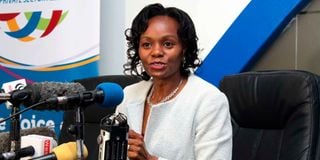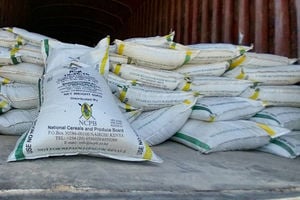One on one with Carole Karuga, Kepsa CEO

Kenya Private Sector Alliance (Kepsa) CEO Carole Kariuki Karuga during a press briefing on the impact of Covid-19 on Kenya's economy in March, last year.
What you need to know:
- It is important for women entrepreneurs to subscribe to business associations it amplifies their voices, something not easy to do when one goes it alone.
- One of the indicators in which we have done well is the registration of businesses, the time it takes and cost. This is to enable businesses, small and big, women-led and otherwise, to register.
- Kepsa is implementing an economic recovery project sponsored by Embassy of Ireland to provide interventions targeted at supporting women-led businesses.
Kepsa has partnered with MasterCard Foundation to offer interest-free loans to women-owned business, however, to get the loan one must be a member of Kepsa or allied Kepsa business association. Why the caveat?
This is for accountability as the loans are repayable in six months. The criteria for a non-Kepsa member or allied to a Kepsa association is simple. There is a Sh10,000 joining fee to Kepsa, payable in instalments.
Why is it important for women entrepreneurs to subscribe to business associations?
Associations amplify their voices, something not easy to do when one goes it alone. Further, the entrepreneur has more opportunities to access training, mentorship, funding, and access to other businesses, government, and markets when they are members of an association.
Is it economically viable to give them loans and expect repayment within six months considering the economy is still sluggish? On what projections of economic recovery was the repayment period based?
These are short-term loans and small amounts to stimulate small businesses affected by Covid-19. They give a leapfrog to these businesses to access more from banks or enable them get back on their feet.
This is a trial period, we shall evaluate, if the time is sufficient, as we go along and make changes if need be. After an economic downturn, many businesses begin to make inroads after six months as the economy begins to recover.
As restrictions are lifted and businesses reinvent themselves, especially with digitisation, recovery has started. Others have begun completely different lines of business, noting that with economic downturns, some businesses are completely lost, while new ones arise.
What if they are unable to repay within the six months?
We hope not, which is why we hold weekly training and mentoring sessions. We have also began the E-commerce Booster Program to assist businesses with little or no digital presence access the training and ensure they can increase and diversify their revenue streams during this Covid-19 period.
Which sectors are of priority in awarding the loans?
While the initial sectors of focus were agriculture, health, manufacturing and retail trade; in issuing the loans, we catered to all businesses, not so much sectors since businesses are unique and were affected differently by the pandemic.
The existing credit schemes target only registered businesses yet a 2016 baseline survey by Kenya National Bureau of Statistics (KNBS) shows women run 60.7 per cent of unlicensed MSMEs. What does this imply to the overall recovery of women-owned business?
One area Kepsa has been involved in with the tripartite relationship with the Ministry of East African Community and Regional Development and the International Finance Corporation (IFC)/ World Bank since 2014, is the Doing Business Indicators. Kenya then, was at number 136 and last year we closed at position 56 worldwide.
One of the indicators in which we have done well is the registration of businesses, the time it takes and cost. This is to enable every business small and big, women-led and otherwise, to register. It is hard to support non-registered businesses, and there is more gain to businesses when registered, as they can benefit from the government backed Credit Guarantee Scheme.
We shall continue to encourage women businesses to register. We will also train and mentor them on how to go about it to enjoy the benefits available to them. In the long term, we hope to see more women owned or led MSMEs benefit from the Credit Guarantee Scheme.
What are the major reasons women fail/ are unable to formalise their businesses?
Mostly it is a lack of information; fear that government will only want taxes from them; fear that formalisation will cause family upheaval once it is known they own a ‘real business’; fear of harassment from some government offices, among other reasons. Again, most of the businesses are micro enterprises with insufficient capital and revenues to cater the cost of registration.
How is Kepsa engaged in eliminating these challenges?
Mentoring and training sessions, sharing information through media and championing for a friendly policy environment to encourage MSMEs to formalise. This includes establishment of a Micro and Small category at KRA for tax purposes, establishment of Biashara Centres across the country to act as one-stop shops for registration services, tax incentives for start-ups and amnesty on tax penalties for businesses that wish to formalize.
The government launched the MSME-Credit Guarantee Scheme late last year, however, it does not offer an affirmative option? Did Kepsa engage the government to ensure it is inclusive in its design?
We have asked for this scheme from many of our engagements with government, including at presidential level, in our regular round tables with the president. It is a work in progress; we shall continue to engage government and banks on the implementation.
Why is the government blind to the realities of women’s challenges in accessing credit?
I would not presume to speak for government but that has not been my experience as we have had great engagements with government on women access to business and credit resulting in such programs as the Access to Government Procurement Opportunities (AGPO) program, and the Women Enterprise Fund.
We have been pursuing for a Biashara Bank that would be the next level from Women Enterprise Fund and offer not only credit, but also other services to small businesses including women-led businesses.
The UN is proposing use of gender bonds in financing women empowerment projects, is this workable in Kenya? Create a picture on how this could/already worked?
Yes, and because of the gains Kenya and Kepsa have made on women and enterprises, we would be glad to explore this with the UN. Gender bonds can be issued through commercial banks, private sector associations (e.g. Kepsa), NGOs or development finance institutions targeting businesses that promote gender equality based on their internal gender policies and practices, or gender focused initiatives.
Kepsa is implementing an economic recovery project sponsored by Embassy of Ireland, how will women entrepreneurs benefit.
This program was designed to provide interventions targeted at supporting women-led businesses. The focus was on training and mentorship to enable the SMEs remain resilient and recover during and post Covid-19, for them to maintain their business, find new business opportunities, preserve existing jobs and increase their revenues, which in turn would increase employment opportunities.
The mentorship program engaged experienced business leaders through online mentorship sessions where a mentor addressed topical issues followed by an interactive question and answer session.
From which counties were the women involved, from which business sectors and of what level of annual turnover?
The trainings targeted 630 participants but reached 1,019 exceeding the target to 162 per cent. The mentorships targeted 400 participants but reached 901 participants exceeding the target to 225 per cent. The attendees were from all counties, and from all sectors of the economy. Turnover was non-discriminatory and varied to allow for inclusion. The trainings and mentorships were conducted virtually, allowing more to participate.
How is Kepsa engaged in pushing for increased representation of women in corporates or business entities?
We work closely with government in pushing for the two-thirds gender rule. We have led by example, ensuring Kepsa board and management meet this criterion. We have a gender and youth sector board that is very active and have seen many corporates including multinationals being led by women, and more women join boards.
Last month, one of our Kepsa members, Nairobi Securities Exchange (NSE PLC) joined the 30 per cent club, a global campaign to take action to increase gender diversity in boards and senior management, cementing the commitment to enhance gender equality in corporate leadership in Kenya.
In addition, Kepsa in partnership with the NSE, Kenya Institute of Management (KIM), and New Faces New Voices (NFNV) are undertaking the 2020/2021 Board Diversity and Inclusion survey to find out how diversity influences decision making, productivity, innovation and overall performance. Its findings will inform advocacy on diversity and inclusivity policies in private and public sectors in the country.
What progress has Kepsa made in encouraging its medium or large-scale members to establish gender responsive policies?
We have both economic and social programs. One of our early social programs involved coming up with the HR policy on new mothers and fathers working with Unicef and government, and later worked on best practices for children. The latter program establishes mother rooms for breastfeeding mothers and some corporates have children areas too. I must say I am proud of corporates in this area because we are ahead of government and other sectors in establishing these.
How, in your view, has Covid-19 changed the business environment for women? What new challenges have emerged for women in business?
It has had benefits and challenges. For many women with children, working from home has not been easy. In addition, women, especially in the low-income areas who could not afford nannies pre-Covid and had to open their businesses or go to work once the children were in school, this was tough. Other challenges included low business opportunities, low cash flow, lack of information on what was happening and impact on business, costly protocols needed to reopen businesses.
What innovations are in place to enable women improve or thrive in their businesses?
Digitisation so they can do business online, deliver to customers, new financial credit facilities, flexi hours, working from home, new business opportunities and demand of certain goods, especially household goods, as more people work from home and started to do home improvements.
What are the major hurdles for women doing intra-trade in the African Continent?
The major challenges faced are non-tariff barriers, lack of financing, infrastructure problems that hamper trade. The major obstacles are based around priorities of the different countries, making it difficult for all to achieve a common ground.
How is Kepsa involved in facilitating women entrepreneurs gain from Africa Continental Free Trade Agreement?
We have always participated at the high level concerning policy formulation to ensure interests of all stakeholders are taken into account.
Who is Carole Kariuki Karuga?
I hold a Bachelor of Arts Degree in Economics and Sociology from the University of Nairobi and a Master’s Degree in Public Administration and International Affairs from Bowling Green State University, Ohio, USA. I have also pursued professional courses on Public-Private Sector Dialogue, Global Leadership and Private Sector Development among others.
I have a wealth of experience in leadership, having worked for Barclays Bank of Kenya, Nairobi Chapel and Sagamore Institute for Public Policy Research, Indianapolis – Indiana, where I acted as a liaison between Kepsa and the institute before formally joining Kepsa. I worked at Kepsa for several years before becoming CEO.
I am credited for transforming Kepsa from a little known business institution to one of the most influential in Kenya and globally. It is the Apex body of the private sector in Kenya, galvanising the private sector through public-private dialogue and influencing the economic and development agenda of the country and Africa.
I currently serve in several boards including, SEZA (Special Economic Zones Authority) as chair, EA Cables (East African Cables PLC) Kenya as member, USIU-Africa Trustees (United States International University–Africa) as member, and a council member at NCAJ chaired by the Chief Justice of Kenya (The National Council of Administrative Justice.





